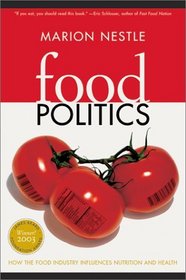Kayote B. (kayote) reviewed Food Politics: How the Food Industry Influences Nutrition and Health (California Studies in Food and Culture, 3) on + 254 more book reviews
Excellent book. Highly recommended. That's the short review, here's the long one:
A heavy book discussing how the food industry influences the information the public receives about health. An excellent examination of the ties between industry & the government, how lobbyists prevent poor press on their products, how congress has gimped the FDA's ability to regulate just about everything.
The USDA is responsible for encouraging American agriculture (especially meat & dairy--fruit/veggies seem red-headed stepchildren at best) and also for dispersing nutrition information to the public? This worked fine when the main problem was not enough calories and the message was "eat more, and varied". Now the problem is too many calories, and the message should be "eat less--especially animal products & sweets". You aren't likely to hear that message, at least not in any fashion understandable, because of the food industry's influence.
Nutrition research hasn't changed much in years. To borrow from another author, eat food. Not too much. Mostly veggies. The confusion comes from the fact that details of nutrients are changing--and the food companies would like to push nutrients rather than food, because they can add nutrients and then make health claims. The difference between "Good for a healthy heart" and "lowers the risk of heart disease" is apparently dramatic from a regulatory standpoint--if not from a consumer's.
A look into the laws that were passed (and why) and the FDA's fight to actually be allowed to do its job was illuminating. The FDA has to take companies to court to get "foods" removed from the shelves, and it only takes one apparently scientific study to require health claims to be allowed (under first amendment rights). The FDA has been recently gimped so badly that the situation, especially for supplements, is nearly as unregulated as it was when the FDA was set up -- which was done to stop the problems.
I had no idea that candy makers were designing lesson plans to sell to schools. Ugh! (Not only do they advertise what kids should be eating in VERY moderated amounts, but apparently they aren't very good lesson plans either).
Fascinating book. It is long, but it is quite readable and I just wanted to keep going. I had to stop occasionally to digest what I had read. Highly highly recommended--my next problem is deciding who among a lot of people I know I want to try and get to read it next!
A heavy book discussing how the food industry influences the information the public receives about health. An excellent examination of the ties between industry & the government, how lobbyists prevent poor press on their products, how congress has gimped the FDA's ability to regulate just about everything.
The USDA is responsible for encouraging American agriculture (especially meat & dairy--fruit/veggies seem red-headed stepchildren at best) and also for dispersing nutrition information to the public? This worked fine when the main problem was not enough calories and the message was "eat more, and varied". Now the problem is too many calories, and the message should be "eat less--especially animal products & sweets". You aren't likely to hear that message, at least not in any fashion understandable, because of the food industry's influence.
Nutrition research hasn't changed much in years. To borrow from another author, eat food. Not too much. Mostly veggies. The confusion comes from the fact that details of nutrients are changing--and the food companies would like to push nutrients rather than food, because they can add nutrients and then make health claims. The difference between "Good for a healthy heart" and "lowers the risk of heart disease" is apparently dramatic from a regulatory standpoint--if not from a consumer's.
A look into the laws that were passed (and why) and the FDA's fight to actually be allowed to do its job was illuminating. The FDA has to take companies to court to get "foods" removed from the shelves, and it only takes one apparently scientific study to require health claims to be allowed (under first amendment rights). The FDA has been recently gimped so badly that the situation, especially for supplements, is nearly as unregulated as it was when the FDA was set up -- which was done to stop the problems.
I had no idea that candy makers were designing lesson plans to sell to schools. Ugh! (Not only do they advertise what kids should be eating in VERY moderated amounts, but apparently they aren't very good lesson plans either).
Fascinating book. It is long, but it is quite readable and I just wanted to keep going. I had to stop occasionally to digest what I had read. Highly highly recommended--my next problem is deciding who among a lot of people I know I want to try and get to read it next!




